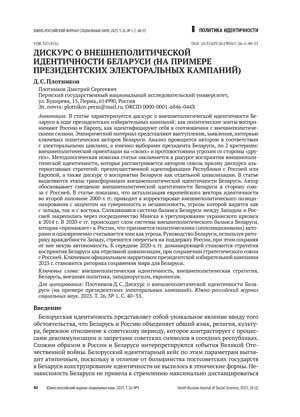Abstract
The paper characterizes the discourse on foreign policy identity of Belarus during presidential election campaigns: the way in which political elites perceive Russia and Europe, as well as how they identify themselves in relation to foreign policy forces. The author analyzes the electoral cycles, namely the presidential elections in Belarus, according to 2 criteria: foreign policy orientation towards “one’s own” and resistance to threats from “others”. The study’s methodological innovation lies in its exploration of foreign policy identity, which is examined by the author through the lens of alternative strategies. These strategies encompass the predominant identification of the Republic with either Russia or Europe, as well as the discourse surrounding the perception of Belarus as a distinct civilization. The paper outlines various transformation stages of the foreign policy identity of Belarus. The author argues that Belarus’s foreign policy identity is shifting towards an alliance with Russia. The paper asserts that the actualization of the European vector of identity in the second half of the 2000s has led to an adjustment of foreign policy positioning, with a focus on its sovereignty and independence, whose threats are perceived both from the West and from the East. The current system of balancing between Belarus and the West and Russia was consolidated through the mediation of Minsk in the settlement of the Ukrainian crisis in 2014. By the middle of 2020s, the dominant strategy becomes to perceive Belarus as a separate civilization, while maintaining a strategic alliance with Russia.
Keywords
References
Адамович, А. (1988). Оглянись окрест! Огонек, 39, 28–30.
Астапеня, Г. (2020). Как белорусский политический кризис меняет отношение к России. РСМД. Режим доступа https://russiancouncil.ru/analytics-and-comments/columns/global-governance/kak-belorusskiy-politicheskiy-krizis-menyaet-otnoshenie-belorusov-k-rossii/?ysclid=m4i2r4sn5u534298112
Белозёров, В.К. (2023). Стратегия как политическое явление и понятие. Вестник Российского университета дружбы народов. Серия: Политология, 25(2), 368–376.
Гончарик, В. (июль 2001). «Вместе с Россией — В Европу». Известия. Режим доступа https://iz.ru/news/249533
Гронский, А.Д. (2020). Белорусский национализм и западнорусизм: проблемы противостояния. Тетради по консерватизму, 2, 162–168.
Гуторов, В.А., & Мальцева, Д.А. (2022). Современные политические стратегии. СПб: РХГА.
Коктыш, К. (2017). Россия и Беларусь: обречены быть вместе. В Т.А. Махмутов (ред.) Эволюция постсоветского пространства: прошлое, настоящее, будущее: хрестоматия (с. 29–35). Москва, РСМД.
Коктыш, К.Е. (2021). Белоруссия: новая геополитическая реальность? Полис. Политические исследования, 3, 91–110.
Крутиков, А. (2020). Концепции истории Белоруссии. II «Русский мир», «литвинизм», «Белорусская цивилизация». Перспективы, 4, 66–79.
Крутиков, А. (2021). Концепции истории Белоруссии. III. «Русский мир», «литвинизм» и «Белорусская цивилизация». Часть 2. Перспективы. Режим доступа https://www.perspektivy.info/history/koncepcii_istorii_belorussii_iii_russkij_mir_litvinizm_i_belorusskaja_civilizacija_chast_2_2021-05-21.htm#4
Мануилова, П.В. (2019). Сотрудничество Российской Федерации и Республики Беларусь в сфере культуры в рамках союзного государства. Постсоветские исследования, 2(6), 420–428.
Морозова, Е.В. (2016). Образ другого/чужого в формировании внешнеполитической идентичности (обзор литературы). Историческая и социально-образовательная мысль, 8(6/2), 183–186.
Мухаметов, Р.С. (2018). Российско-белорусская интеграция: внутриполитические причины создания. Парадигмы и процессы, 4(33), 157–163.
Неменский, О.Б. (2016). «Последний союзник»: российско-белорусские отношения на современном этапе. Контуры глобальных трансформаций, 9(5), 24–39.
Осипов, М. (Сентябрь 2021). В Беларуси впервые отмечают День народного единства. Союз Беларусь/Россия. Режим доступа https://rg.ru/2021/09/15/v-belarusi-vpervye-projdet-den-narodnogo-edinstva.html
Прохоренко, И. (2024). Идентичность как ключ к пониманию мировой политики. Международная аналитика, 15(1), 11–19.
Павлова, А.В. (2024). Становление внешнеполитической идентичности де-факто государства: от провозглашения к международно-правовой субъектности (казус Абхазии). Международная аналитика, 15(1), 154–173.
Плотников, Д.С. (2018). Изменение «политики памяти» в государствах-союзниках России на постсоветском пространстве после 2014 года. Вестник Пермского университета. Политология, 1, 92–107.
Плотников Д.С. (2020). Интерпретации прошлого в странах Евразийского Союза в контексте интеграционных процессов. Центральная Евразия, 1(4), 51–64.
Понамарева, А.М. (2024). Историческая политика Республики Беларусь: перипетии эволюции. Вестник Московского университета. Серия 25: Международные отношения и мировая политика, 4(16), 95–139.
Скриба, А.С., Дроздова, А.В. (2020). Белорусская внешняя политика и эволюция внешнеполитической среды. Пути к миру и безопасности, 2(59), 150–166.
Тараторин, Д. (2024 июнь 26) Белорусская оппозиция добивается особого статуса в ООН. Независимая газета. Режим доступа https://www.ng.ru/cis/2024-06-26/1_9036_status.html
Фадеева, Л.А., Плотников, Д.С. (2021). Политика идентичности и международная безопасность европейских государств постсоветского пространства. Вестник Российского университета дружбы народов. Серия: Политология, 4(23), 614–629.
Царик, Ю.Ю. (2020). Политэкономия Беларуси, эволюция белорусско-российских отношений и политический кризис 2020 года. Пути к миру и безопасности, 2(59), 133–149.
Цедилина, Е. (2011). Беларусь после президентских выборов — между Россией и Западом. Режим доступа https://www.imemo.ru/files/File/magazines/rossia_i_novay/2011_01/ECED_belorus.pdf
Шаншиева, Л.Н. (2014). Дуализм белорусской идентичности. В Ю.И. Игрицкий (ред.) Европеизм и национализм в странах Восточной Европы (с. 7–26) Москва: ИНИОН РАН.
Шаповалова А.И. (2011). Структура внешнеполитической идентичности государства. В И.С. Семененко (ред.) Идентичность как предмет политического анализа (с. 65–69). Москва: ИМЭМО РАН.
Швецов, Ю. (2018). Белорусы: два проекта: о закономерностях развития белорусской культуры. Дискуссии и полемика, 1 (12), 114–115.
Швецов, Ю. (2005). Объединенная нация. Феномен Беларуси. Москва: Европа.
Шимов, В.В. (2010). Россия и русские как фактор Белорусской идентичности. Социология, 4, 76–84.


